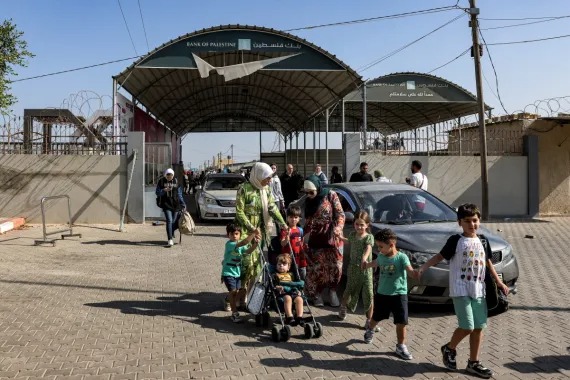As the Israel-Hamas conflict continues to grip the world’s attention, a new question looms large: Will Egypt open its doors to Palestinian refugees in the event that Israel pushes them out of Gaza? Analysts have suggested that Egyptian President Abdel Fattah el-Sisi faces a complex dilemma, torn between the humanitarian imperative and the potential for domestic instability if a massive influx of Palestinian refugees crosses its borders.
The Unlikely Scenario of Absorbing Gaza’s Displaced Population
Egypt is home to approximately 2.2 million Palestinians who could potentially be displaced from the Gaza Strip due to the ongoing conflict. However, experts believe that the likelihood of Egypt absorbing this large population is extremely low. Nancy Okail, the President and CEO of the Center for International Policy, expressed skepticism, stating that the political cost of accepting these refugees far outweighs any potential benefits. She cautioned against the possibility of domestic unrest if a sudden influx of Palestinian refugees were to arrive.
Rumors have also emerged that Israeli leaders may attempt to entice Cairo into accepting displaced Palestinians by offering to alleviate some of Egypt’s significant external debt. Nonetheless, Egyptian President Abdel Fattah el-Sisi has thus far rejected this proposal, and there have been no indications of a change in this stance.
Timothy Kaldas, an expert on Egypt’s political economy, emphasized that Palestinians should have the choice to seek asylum in neighboring countries, a protection that Egypt and Israel currently deny. Accepting a significant number of Palestinian refugees could be seen as enabling Israel to expand and solidify its occupation of Palestinian territories, potentially leading to widespread unrest and even endangering President el-Sisi’s tenure.
Security Concerns: Fears of Uprooting Palestinian Fighters into Egypt
President el-Sisi has voiced concerns that accepting refugees from Gaza could provide a sanctuary for Palestinian fighters to establish a new base in Egypt’s Sinai region, possibly leading to “terrorist operations.” Such a development could jeopardize Egypt’s peace deal with Israel, brokered at the Camp David Summit in 1978. While there are legitimate security concerns, experts suggest that smaller armed groups may pose a more immediate threat than Hamas, given their potentially destabilizing influence.
Despite past tensions, Egypt and Hamas have experienced a degree of rapprochement since 2016, cooperating to counter ISIS cells and mediating ceasefires between Hamas and Israel. Nevertheless, the Egyptian government remains wary of Hamas due to its substantial military capabilities and its ties to the Muslim Brotherhood, a group that has faced repression in Egypt.
Opportunity Amid Pressure: How Egypt May Leverage the Situation
Some experts argue that President el-Sisi may use the pressure to accept displaced Palestinians as an opportunity to bolster his position. By highlighting Western support for Israel amid the ongoing conflict, his government can argue that international concern about human rights abuses in Egypt is hypocritical. Hossam Bahgat, the founder of the Egyptian Initiative for Personal Rights (EIPR), suggests that the pressure from some countries to potentially allow the forced displacement of Palestinians will give el-Sisi greater cover to commit human rights violations domestically without having to be mindful of his government’s international image.
Egypt faces a complex dilemma as the Israel-Hamas conflict unfolds, with significant political, security, and diplomatic implications. While the fate of the displaced Palestinian population remains uncertain, the world watches closely to see how Egypt navigates this challenging situation.
















